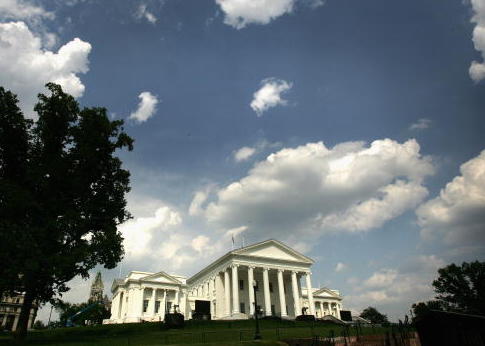The top two Democrats vying to become Virginia's next governor are also fighting for the support of organized labor.
Right to work laws took center stage at the May 9 debate between Lt. Gov. Ralph Northam and former Obama administration appointee Tom Perriello. The candidates were asked their opinion on the law, which bars making union membership a condition of employment, and whether they would break with current Democratic Gov. Terry McAuliffe's past support for it.
"I think it undermines the middle class and working class here in Virginia," Perriello said.
Northam said that he would support pro-union legislation like project labor agreements, which set wage floors for government contracts at union pay rates to help bolster organized labor. He highlighted his efforts to block enshrining right to work in the state constitution as lieutenant governor, but warned that immediate repeal of right to work laws would be complicated by Republican control of the legislature in the state, saying Democrats "have to be realistic in Virginia."
"I want to congratulate labor tonight for helping to defeat the constitutional amendment this past year … I stood up and I traveled around the Commonwealth of Virginia and helped to fight that as well," he said. "I think rather than pick fights that we perhaps can’t win right now, we need to talk about how can we help labor, how can we help with PLAs, which are project labor agreements. Those are very important to labor and unions right now."
Republican candidate and former RNC Chairman Ed Gillespie said that his campaign plans on preserving right to work in the state. Gillespie said that the law serves as an engine for job growth and that his Democratic counterparts are putting their own political interests above those of improving the state's economy.
"We must do everything we can to restore the Commonwealth's rightful place as one of the best states in the country for business," Gillespie said in a statement. "While Lt. Gov. Northam and Congressman Perriello make political calculations to win the Democratic primary, I'll continue to put forward bold policies that will grow our economy. It's time to make Virginia the best state in the nation again in which to live and to work. Some issues should unite us: support for Virginia's Right to Work laws is one of them. Both the Democrats running for governor are out of step with Virginia's job creators."
The National Right to Work Committee said that the fight over the long-standing law places the candidates against the general trend of the electorate. While Virginia voters rejected putting right to work in the state constitution in 2016, there has been no call to repeal the legislation, according to spokesman Patrick Semmens.
"Sucking up to Big Labor by proposing to give union officials the power to have a worker fired for refusing to pay union dues may win the forced-dues-funded backing of DC-based union bosses, but it puts candidates squarely against the longstanding and bipartisan support for Virginia's Right to Work law," Semmens said. "Strong majorities of Americans, Virginians and even union members oppose mandatory union dues, which is why Right to Work has been expanding recently with six new Right to Work laws in the past five years."
Virginia was one of the first right to work states in the country after barring coercive union membership in 1947. The state has one of the lowest union populations in the country with only 4.3 percent of all workers belonging to organized labor groups—down from 5.4 percent in 2015, according to the Bureau of Labor Statistics.
